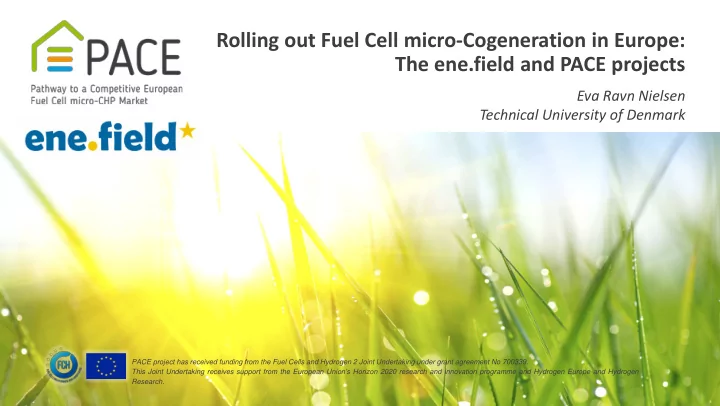

Rolling out Fuel Cell micro-Cogeneration in Europe: The ene.field and PACE projects Eva Ravn Nielsen Technical University of Denmark PACE project has received funding from the Fuel Cells and Hydrogen 2 Joint Undertaking under grant agreement No 700339. This Joint Undertaking receives support from the European Union’s Horizon 2020 research and innovation programme and Hydrogen Europe and Hydrogen Research.
TESTING Booth E57 Technical Forum today at 15:40 TRAINING Public Forum Wednesday at 13:00 CONSULTANCY PROJECT WORK Eva Ravn Nielsen, DTU Energy
What is Fuel Cell micro-Cogeneration? 3
Why Fuel Cell micro-Cogeneration? Fuel Cell micro-Cogeneration is a highly efficient home energy system that simultaneously produces heat and electricity Empowers consumers Supports the European energy transition Provides greater flexibility for the energy system Fosters innovation and high-value jobs 4
The research leading to these results has PACE project has received funding from the Fuel Cells and received funding from the European Union ´ s 7th Hydrogen 2 Joint Undertaking under grant agreement No 700339. Framework Programme (FP7/2007-2013) for the Fuel Cells and Hydrogen Joint Undertaking This Joint Undertaking receives support from the European Technology Initiative under Grant Agreement Union’s Horizon 2020 research and innovation programme and Number 303462. Hydrogen Europe and Hydrogen Research.
From research to mass market Mass market Prototypes
Introduction to ene.field project • L arge European demonstration of Fuel Cell micro-Cogeneration for private homes and small commercial buildings. • Proj ect duration: 2012-2017 • 1,046 units in 10 countries • More than 5.5 million hours of operation, 4.5 GWh of power produced • Analyses: Customer satisfaction performance, barriers, environmental LCA, cost analysis, smart grid capability...
Project consortium
Customer satisfaction S urveys show that more than 90% of end users are pleased with the environmental performance, the comfort and warmth and running costs of their fuel cell micro-cogeneration unit 9
Micro-Cogeneration delivers important distribution network cost reductions Up t to 31 G GW Micro-Cogeneration distribution network cost reductions per kW installed (2020-2050) micro-Cogeneration potential in 2030 € 62 62 bn bn in avoided grid investments associated with micro-CHP Up to 28% 28% of EU’s projected grid reinforcements needs potentially delivered by micro- From “ Benefits of Widespread Deployment of Fuel Cell micro-CHP in Securing and Decarbonising the Future European Electricity System” authored by Imperial College London Cogeneration 10
Environmental Life Cycle Assessment CO 2 eq. savings compared to Gas Condensing Boiler • LCA: Generally less green house gas emission from FC micro-Cogeneration than from gas condensing boiler or heat pump solutions • Higher benefits for higher utilisation of the fuel cell • Higher benefits for more carbon intentisve power mixes [T.M. Bachmann, F. Carnicelli, P. Preiss, 2017]
Potential CO 2 emission reductions CO 2 emissions savings across Europe in 2030 : More than 32 mil tonnes equivalent to 25% of Belgium’s emissions in 2015 equivalent total yearly emissions of more than 5,3 million cars 8 (million tonnes of CO2/year) Reduction in emissions 7 6 5 4 3 2 1 0 AT BE DE DK ES FR GB IT NL PL RO
PACE at a glance 10 Partners > 2,500 8 5 € 90m Countries Fuel Cell micro- Years Total budget Cogeneration units > 10,000 FC micro-cogeneration units/year post 2020
Towards a mass market uptake Reduce costs and improve competitiveness Improve products’ performance Establish Fuel-Cell micro-Cogeneration as a standard technology Raise awareness on Fuel-Cell micro- Cogeneration Demonstrate product readiness as a key component in the delivery of EU’s energy goals
Conclusion ● Micro-Cogeneration technology works - robust and reliable ● End-users are satisfied ● Environmental benefits ● Large-scale production will bring costs down ● Working on next generation systems enefield.eu 16 pace-energy.eu
Thank you Contact: Eva Ravn Nielsen DTU Energy EVRN@dtu.dk Booth: E57 This project has received funding from the Fuel Cells and Hydrogen 2 Joint Undertaking under grant agreement No 700339. This Joint Undertaking receives support from the European Union’s Horizon 2020 research and innovation programme and Hydrogen Europe and N.ERGHY.
Recommend
More recommend